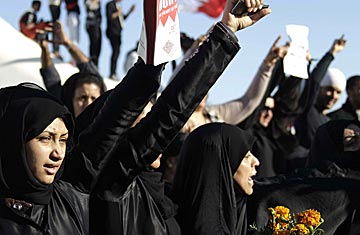
Bahraini anti-government protesters return to Pearl Square in Manama on February 19, 2011.
(2 of 2)
He is referring to a referendum, now ten years old, in which Bahrainis overwhelmingly voted for a constitutional monarchy. The reforms stalled halfway through the decade, and while there is an elected parliament, the prime minister, who came to power 40 years ago, has maintained his position. He also happens to be the king's uncle, and is widely loathed by Bahrain's Shi'ite majority. To ensure that the pressure to dialogue stays strong, the al Wafaq party broadcast a mobile phone text message to followers: "Go to the square. Do peaceful demonstrations. Stay." Sheikh Ali Salman, the party's spiritual leader, gave a speech in which he mourned the dead, praised the medical community for their aid and thanked the international media. Both the teachers' association and labor union called for a strike in order to continue protesting for change at the roundabout.
Not that there was any question OF ceding ground. "This was a victory that was bought with our blood," said Maithan Haida, a 32-year-old security officer, who swore he would not leave the square until the demands of the protesters were met. The government, he said, had blood on its hands. "We don't trust them." He cradled in his hands a large wilting marigold. As part of the protesters' peaceful campaign, he and several others had attempted to give flowers and water to the police guarding the entrance to the roundabout. The attempts failed. The police, petrified, threatened to fire more teargas. "We offered water and peace," says Haida. "But I don't think they understood. They are not Bahraini. They don't speak Arabic."
Haida voiced a complaint common to many of the protesters, who accuse the government of pursuing a decade-long program to increase the Sunni population by granting citizenship to Jordanians, Tunisians and Pakistanis in exchange for employment in the country's military and government sectors. The newly nationalized are given preferential housing and health benefits, even as the indigenous Shi'ite suffer from unemployment.
Hasan Dhahi, an aircraft engineer who graduated from a British University a year ago, says that despite his stellar resume and high scores, he still can't get a job. He says Sunnis — including immigrant Sunnis — get better treatment, especially in the sought after government sector. Even though Shi'ites make up an estimated 70% of the population (the government has not released official figures) they are not represented by the same numbers in the government. Shi'ite parties have 18 seats in the 40-seat Parliament, largely due to a successful gerrymandering campaign. "We voted for democracy, but we have yet to see it," he says. Still, he has nothing against Sunnis, he emphasizes, just the policy that privileges one sect over another. "The government tries to come between Sunni and Shiite, but we are friends. It won't work."
As if to underscore that point, the protesters, now marching around the roundabout waving their flags, burst into a chorus of "Sunni and Shiite Together. We are brothers. We won't sell out our nation." It's been a mantra repeated throughout the weeks-long protests, and in many ways may have saved the movement. "The whole point of our protest is to unite people," says Marayam al Ahawaja, head of the foreign relations section of the Bahrain Center for Human Rights. "It has been a long term policy of the government to institute sectarianism, a tactic of divide and conquer. Unfortunately they have been successful in driving a wedge between us."
She says Sunni friends have told her stories of a government scare campaign; that if the Shi'ites take over, they will institute a theocracy, behead all the Sunnis, or worse — sell the country to Iran. Other scare tactics have been effective as well. One Sunni activist stood up with the protesters earlier in the week to express solidarity. He has since disappeared, and many assume he was detained by the authorities.
"This isn't about religion, it's about rights," exclaims Jaffar al Jazeery, an elderly religious leader wandering the grassy interior of the roundabout. He wears the tightly wrapped white turban and gauzy black cloak of a cleric. "When the government says we are influenced by Iran, it is only on the religious side. Here we are protesting for our rights as Bahrainis."
Sabah, the occupational therapist, agrees. "We don't want Shi'ites to rule Bahrain. We want democracy. I lived for four years in the UK, where there is a constitutional monarchy. Why can't we have that too?"
